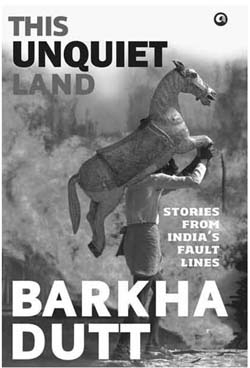I must admit to having agreed to review this book by the celebrated Barkha Dutt after a spectacular launch spearheaded by Dutt herself through her pivotal position in NDTV, with a degree of trepidation. Yet the opening chapters and my discovery of Barkha being the daughter of that Amazon among free India’s young journalists of the time, Prabha Dutt, much admired by her contemporaries, who, like her, quested to break new ground in a brave new world, allayed these apprehensions. Through her own words Dutt comes across as a demonstrable example of what free India has made of the new woman: emancipated, independent, free thinking, not only ready but keen to challenge accepted wisdom and go where few Indian women have gone before. And although the book is described as Stories from India’s Fault Lines, this book is more about Dutt and assessing through her experiences, the maturing of India’s womanhood, than in helping understand the subjects that she identifies as the faultlines.
Dutt describes her youth and development as her having been brought up as part of a modern, free thinking household, with parents deeply involved in the making of free India and of the future of our peoples. With extraordinary perspicacity she recognizes that her ideal of women’s liberation, nurtured in the rarefied, westernized confines of St Stephens whence she graduated, and rooted in the feminism of Germaine Greer, had little to do with the tribulations of subaltern India’s womanhood. Very early in life she discovered that although modern India might boast of the achievements of many great women, including her own mother, the shackles that bound Indian womanhood were not understood or indeed addressed in our paternalistic society. She speaks frankly of her own relationship with a fellow student as a postgraduate student in Jamia Millia Islamia University, when she experienced violence in a personal relationship and despite her supposed confidence and lofty self image, found herself manipulated and blackmailed and incapable of resisting.

